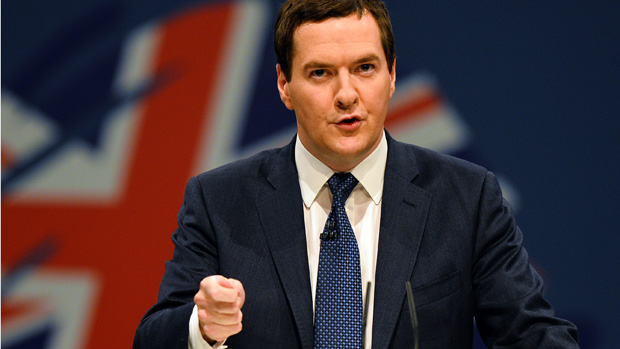George Osborne's budget surplus rules: how they will work
The Chancellor is staking his legacy on a tough new economic plan to 'fix the roof while the sun is shining'

A free daily email with the biggest news stories of the day – and the best features from TheWeek.com
You are now subscribed
Your newsletter sign-up was successful
George Osborne is moving ahead with plans for a new fiscal framework that will allow the government to borrow only in exceptional circumstances.
The Chancellor will introduce a rule to prevent future governments from spending more than they collect in revenue during periods of growth in order to cut the national debt and prepare for uncertainty in the future.
"With our national debt unsustainably high, and with the uncertainty about what the world economy will throw at us in the coming years, we must now fix the roof while the sun is shining," Osborne will say in his annual Mansion House speech.
The Week
Escape your echo chamber. Get the facts behind the news, plus analysis from multiple perspectives.

Sign up for The Week's Free Newsletters
From our morning news briefing to a weekly Good News Newsletter, get the best of The Week delivered directly to your inbox.
From our morning news briefing to a weekly Good News Newsletter, get the best of The Week delivered directly to your inbox.
Running a budget surplus is something few governments have been able to achieve since World War Two, the BBC points out. The new framework will, however, allow the country to run a deficit when in recession and the task of policing the plan will fall on the independent Office for Budget Responsibility.
Osborne will also announce that a group known as the Committee of the Commissioners for the Reduction of the National Debt will be revived and meet for the first time in 150 years.
Initially set up to help repair the economic damage caused by the Napoleonic wars, the group will include the governor of the Bank of England, the speaker of the House of Commons, and the Lord Chief Justice, who will meet to discuss a plan for permanent deficit reduction.
The House of Commons is expected to vote on the proposal later this year, but it is likely to have vocal critics on the left and will be a major test for the next Labour leader, says the Financial Times.
A free daily email with the biggest news stories of the day – and the best features from TheWeek.com
Peter Dominiczak at the Daily Telegraph agrees, describing the move as "a trap" for the Labour party, which will face widespread criticism if it doesn't support the vote. "After the borrowing under the last Labour government and the policies put forward by Ed Miliband, the next leader of the party will have a lot of questions to answer," a government source told the newspaper.
The Chancellor's proposals have already been viewed by many as an attempt to secure his legacy. "Osborne sees his proposed budget surplus law as the capstone of his struggle to restore order to the public finances since becoming chancellor in 2010: a means of locking in his legacy of balancing the books," says the Financial Times.
-
 Rock Villa, Bequia: a hidden villa on an island epitomising Caribbean bliss
Rock Villa, Bequia: a hidden villa on an island epitomising Caribbean blissThe Week Recommends This gorgeous property is the perfect setting to do absolutely nothing – and that’s the best part
-
 Mexico’s vape ban has led to a cartel-controlled black market
Mexico’s vape ban has led to a cartel-controlled black marketUnder the Radar Cartels have expanded their power over the sale of illicit tobacco
-
 Nepal’s fake mountain rescue fraud
Nepal’s fake mountain rescue fraudUnder The Radar Arrests made in alleged $20 million insurance racket
-
 The high street: Britain’s next political battleground?
The high street: Britain’s next political battleground?In the Spotlight Mass closure of shops and influx of organised crime are fuelling voter anger, and offer an opening for Reform UK
-
 Is a Reform-Tory pact becoming more likely?
Is a Reform-Tory pact becoming more likely?Today’s Big Question Nigel Farage’s party is ahead in the polls but still falls well short of a Commons majority, while Conservatives are still losing MPs to Reform
-
 Taking the low road: why the SNP is still standing strong
Taking the low road: why the SNP is still standing strongTalking Point Party is on track for a fifth consecutive victory in May’s Holyrood election, despite controversies and plummeting support
-
 What difference will the 'historic' UK-Germany treaty make?
What difference will the 'historic' UK-Germany treaty make?Today's Big Question Europe's two biggest economies sign first treaty since WWII, underscoring 'triangle alliance' with France amid growing Russian threat and US distance
-
 Is the G7 still relevant?
Is the G7 still relevant?Talking Point Donald Trump's early departure cast a shadow over this week's meeting of the world's major democracies
-
 Angela Rayner: Labour's next leader?
Angela Rayner: Labour's next leader?Today's Big Question A leaked memo has sparked speculation that the deputy PM is positioning herself as the left-of-centre alternative to Keir Starmer
-
 Is Starmer's plan to send migrants overseas Rwanda 2.0?
Is Starmer's plan to send migrants overseas Rwanda 2.0?Today's Big Question Failed asylum seekers could be removed to Balkan nations under new government plans
-
 Has Starmer put Britain back on the world stage?
Has Starmer put Britain back on the world stage?Talking Point UK takes leading role in Europe on Ukraine and Starmer praised as credible 'bridge' with the US under Trump